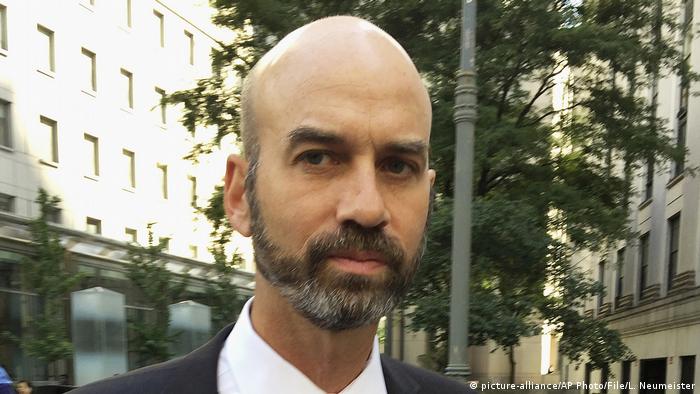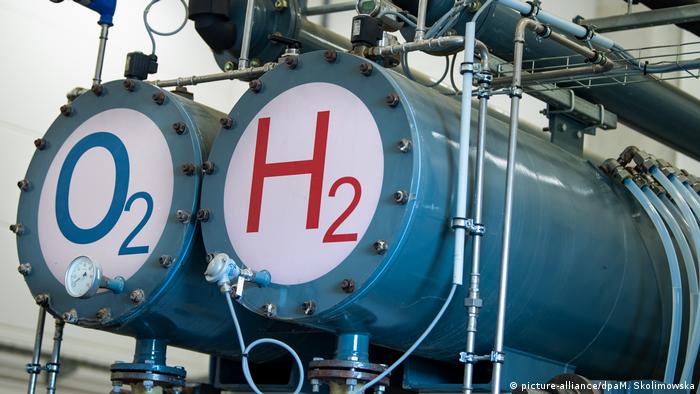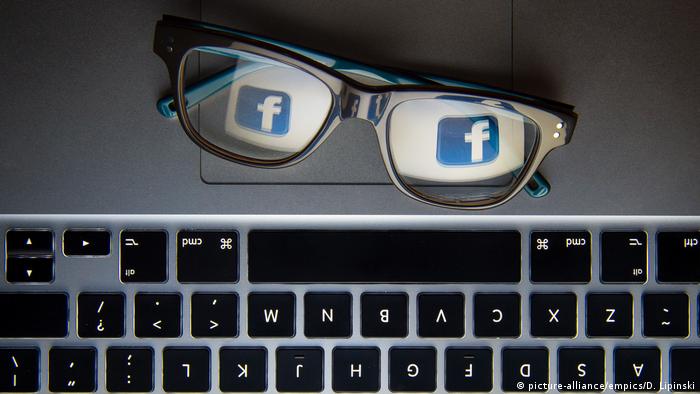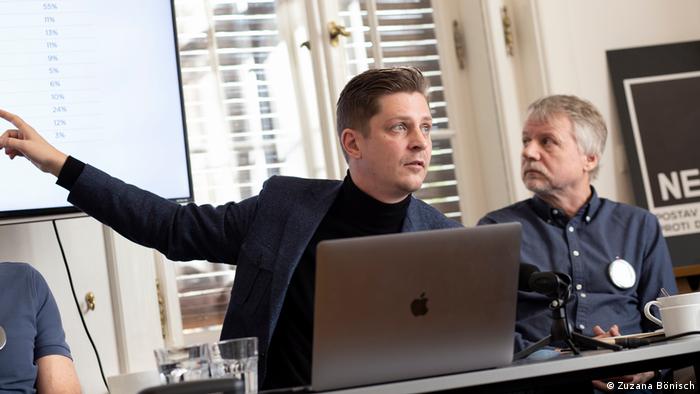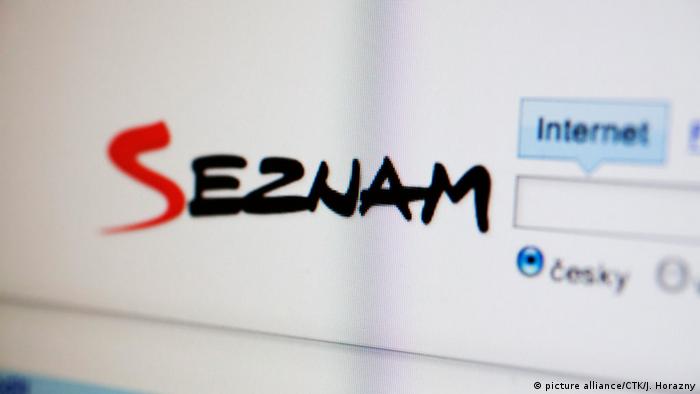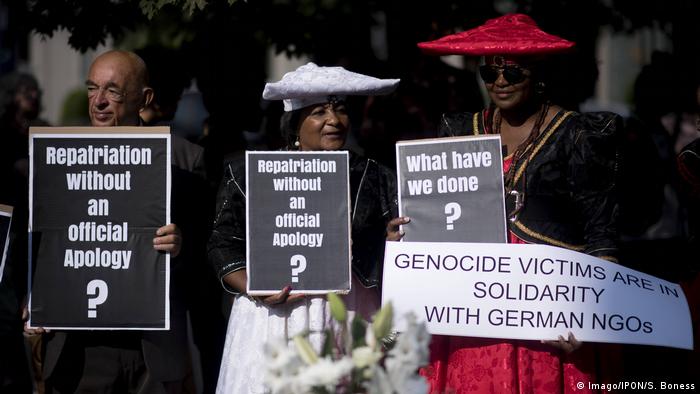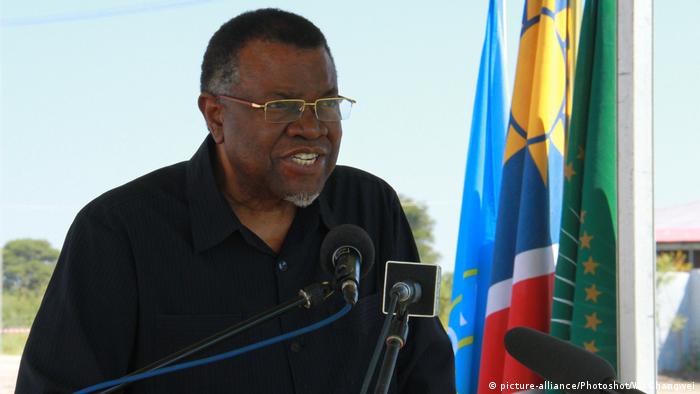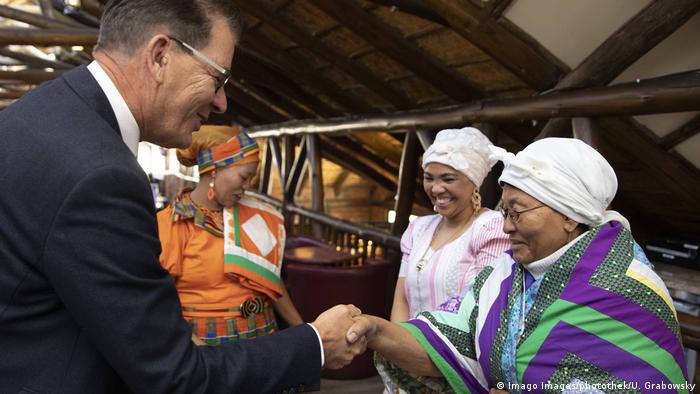Starbucks Won't Let Employees Wear Gear That Supports Black Lives Matter Because It Is Political Or Could Incite Violence
The retail giant said wearing pro-BLM pins or T-shirts would violate its dress code policy because the accessories advocate a "political, religious, or personal issue."

Andrew Caballero-reynolds / Getty Images
As protesters took to the streets in hundreds of cities across the United States and the globe to support Black Lives Matter and decry police brutality, Starbucks, like many major American companies, rushed to publicly proclaim its support for the movement and pledged to do more to combat racial injustice.
On June 1, the coffee retailer vowed on Twitter to "stand in solidarity with our Black partners, customers and communities.” A few days later, it tweeted, and then pinned, a more in-depth commitment to supporting Black Lives Matter and confronting bias and racism and to “being a part of change.”
Being part of that change does not extend, however, to allowing the company’s baristas and other employees to wear T-shirts, pins, or any other accessory that mentions Black Lives Matter.
In fact, the company explicitly stated that Black Lives Matter attire was prohibited from the lists of things employees can wear due to its dress code policy, which also includes any type of political, religious, or personal accessories or clothing. However, as many employees noted to BuzzFeed News, Starbucks not only exempts buttons and attire celebrating LGBTQ rights and marriage equality, but hands them out.
According to an internal bulletin obtained by BuzzFeed News, store managers had been contacting senior leadership on behalf of employees who wanted to wear BLM-related attire as protests continued to sweep major cities and small towns across the country.
In response, management, according to the memo from last week, argued that wearing clothing and accessories highlighting Black Lives Matter could be misunderstood and potentially incite violence. The bulletin pointed employees to a video, which has now been removed, in which its VP of inclusion and diversity explained that "agitators who misconstrue the fundamental principles" of the movement and could use them to "amplify divisiveness."
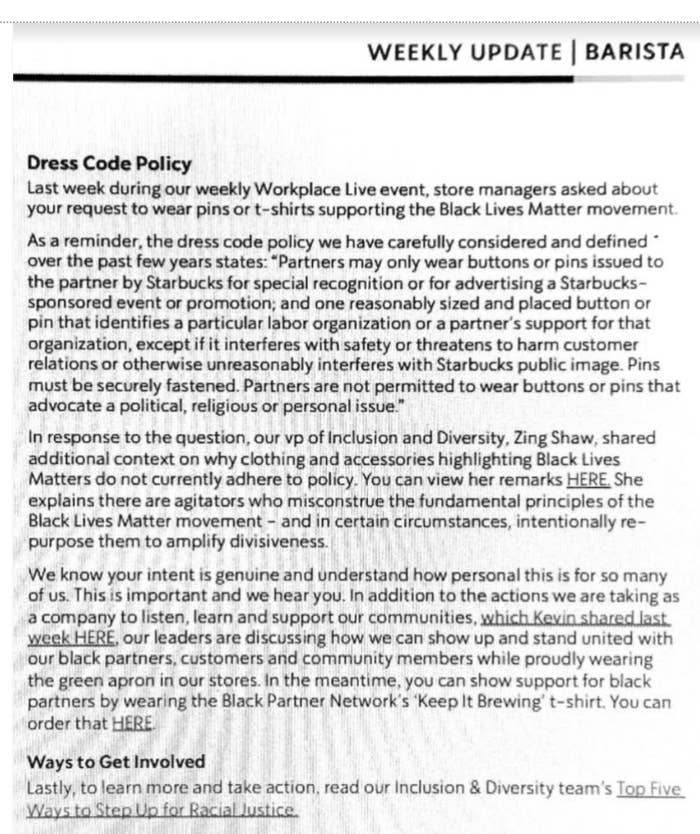
Provided to BuzzFeed News
Calvin Bensen, a 22-year-old barista from Atlanta, told BuzzFeed News the company’s response was “disappointing in ways I can’t express in words. That statement prioritizes those who feel discomfort over Black lives.” He called it “violent.”
"My skin color incites violence at Starbucks. Should I not come to work?" he asked. "It is silencing and Starbucks is complicit. Now more than ever, Starbucks needs to stand with us."
In an interview, a Starbucks spokesperson said the company is dedicated to helping end "systemic racism,” but that the dress code policy would remain in place because it was necessary “to create a safe and welcoming” environment for customers and staff.
"We respect all of our partners’ opinions and beliefs, and encourage them to bring their whole selves to work while adhering to our dress code policy," the spokesperson said.
Starbucks created its “Third Place” policy in May 2018, which aims to create a space within its stores that is inclusive and welcoming to all customers.
The company has also pledged $1 million to organizations promoting racial equity, partnered with Arizona State University to design anti-bias resources and training, and says it is actively hosting open and necessary conversations with employees about "racism the Black community faces."
Starbucks partners also have the option to buy a T-shirt from its approved "Black Partner Network," which aims to spark conversation "around the African diaspora."
The path forward requires open and honest conversations about racial injustices. On Saturday, Starbucks partners came together in an open forum to listen and support one another. It’s going to take each of us to drive necessary change. https://t.co/ZUlBV9MgFF
Many employees were not satisfied. For some employees, the statements feel "performative," "shallow," and "hypocritical.” A barista on the east coast told BuzzFeed News that on the ground, the company is still working to preserve its image with customers to not disrupt sales.
"We have a police detail outside of the store most days anyway. Let's just call him over if a customer is offended by someone's BLM pin," the employee said. "There's something deeper here. [Starbucks CEO] Kevin Johnson talks a big talk on Twitter, but he's still the head of a multibillion-dollar company that has to keep up with its image. God forbid if employees tarnish that pristine global image."
Another worker in Colorado agreed that the decision was made to "not cause conflict with customers" and did not agree with the company's explanation that Black Lives Matter should be defined as political.
"I don't think asking for and supporting those who want basic human rights is necessarily political," this person said.
At a location in Washington, a manager said that he felt "muted" by not being able to visibly show his support at work.
"I work in a store where I am one of five people of color out of 30, and it would be nice to be able to show some sort of unity with them," he said. "I personally am having a rough time with this, as most people know Starbucks caters to a predominantly Caucasian customer base and Starbucks expects us to uphold an amazing customer experience for these demographics, to ensure the money keeps coming in."
Nearly every employee with whom BuzzFeed News spoke pointed out that the company allowed workers to wear accessories supporting marriage equality and LGBTQ rights, even giving them pins and Gay Pride shirts, since June is Pride Month.
Benson, who is black and transgender, said watching how Starbucks ralied behind and continues to embrace the LGBTQ movement made its response to Black Lives Matter even more “surprising and disappointing.”
In a stories section on its website, Starbucks has a comprehensive timeline of its history of "LGBTQ Inclusion," writing, "For more than three decades, Starbucks has been committed to building a culture where all are welcome, standing as an ally to the lesbian, gay, bisexual, transgender and queer community." Over the years, the company has launched a spate of initiatives to ensure it helped achieve LGBTQ workplace equality, supported LGBTQ employees with healthcare, and has marched in Pride parades around the world.
"Starbucks LGBTQ+ partners wear LGBTQ+ pins and shirts, that also could incite and create violent experiences amongst partners and customers," Benson said, adding that employees were able to wear LGBTQ+ pins and shirts without purchasing them directly from Starbucks. “We have partners who experienced harassment and transphobia/homophobia for wearing their pins and shirts, and Starbucks still stands behind them."
Some employees, however, agree with the company's position. On an internal portal with links and information on how to stand up for racial justice, including links to support different organizations like the NAACP, one worker thanked Starbucks for sharing the resources, but also for its commitment to not allowing partners to wear BLM gear, noting that for some it represents anti-police sentiment and unrest.
"Think of the families that have also have hurt emotional [sic] and physically from violence and threats from those that associate with BLM that are not peaceful," they wrote, talking specifically about police officers.
The idea that Black Lives Matter is violent and politically divisive, Benson said, actually hurts the cause of racial equity. And it's even more infuriating now, at a time when the company is publicly supporting the cause.
"Our movements are just too controversial for Starbucks to stand behind," he said.


